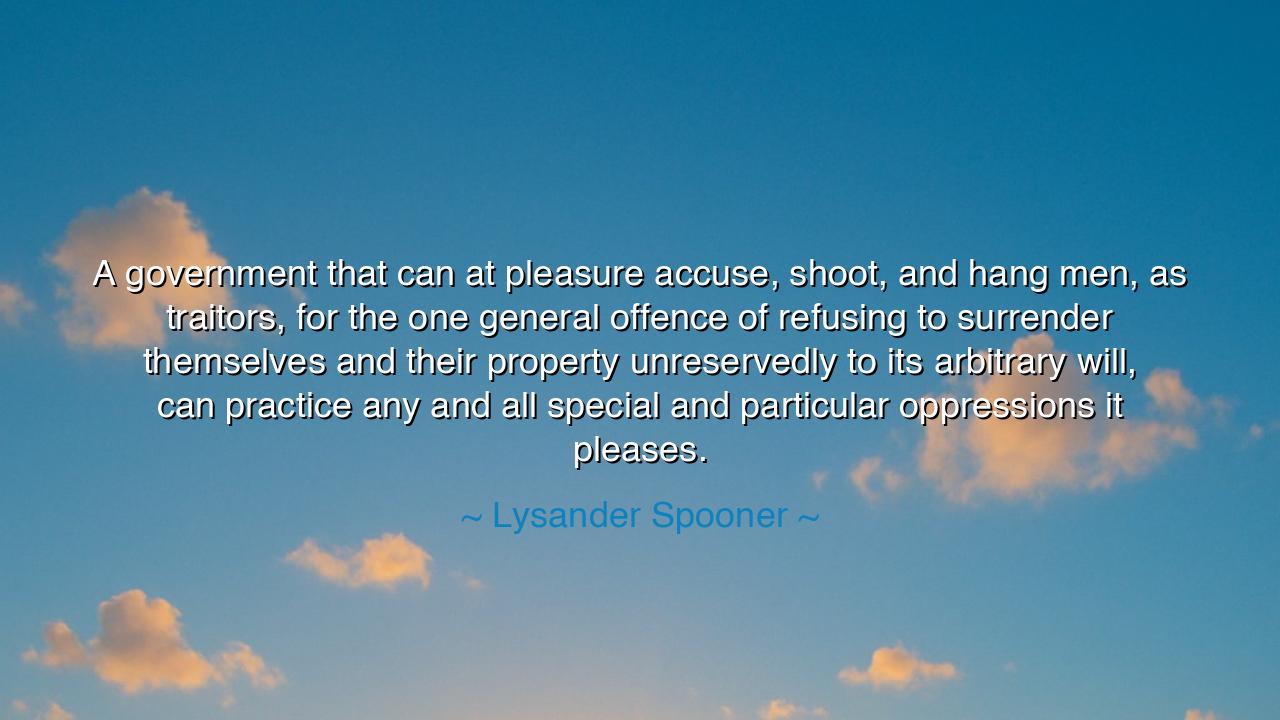
A government that can at pleasure accuse, shoot, and hang men, as
A government that can at pleasure accuse, shoot, and hang men, as traitors, for the one general offence of refusing to surrender themselves and their property unreservedly to its arbitrary will, can practice any and all special and particular oppressions it pleases.






"A government that can at pleasure accuse, shoot, and hang men, as traitors, for the one general offence of refusing to surrender themselves and their property unreservedly to its arbitrary will, can practice any and all special and particular oppressions it pleases." — Lysander Spooner
In this fierce and thunderous cry, Lysander Spooner speaks as one who has looked tyranny in the face and vowed never to bow before it. His words burn with the fire of a man who understood that freedom is not a gift granted by rulers, but the birthright of all who draw breath. He saw clearly that once a government claims the right to accuse and destroy those who resist its arbitrary power — to shoot and hang men for the mere crime of defending their own liberty — then it has unmasked itself as tyranny in its purest form. In such a realm, the sword of justice becomes the blade of oppression, and the law, once a shield for the people, becomes their executioner.
Spooner was not a man of timid words or comfortable silence. He lived in the turbulent heart of nineteenth-century America, when questions of slavery, war, and state power tore the conscience of a nation in two. Though he despised slavery with every fiber of his being, he also condemned the growing despotism of a federal government that crushed dissent and demanded unquestioning obedience. To him, both slave masters and authoritarian rulers were kin — each claiming dominion over the lives and property of others. When he wrote these words, he was warning not only his age, but all ages: beware the power that claims to rule “for your good,” yet destroys all who resist its will.
The essence of Spooner’s warning lies in the phrase “arbitrary will.” This, he knew, was the essence of tyranny — the power to act without moral or legal restraint, to declare a man guilty not because he has done wrong, but because he has defied authority. The tyrant, clothed in law and ceremony, does not need to commit open atrocity every day; it is enough that his hand hovers over the sword, for fear alone enslaves nations. Once a people surrender their right to question and resist, their fate is sealed. What follows is not governance, but dominion; not justice, but obedience enforced by terror.
Consider the grim example of the French Revolution. In its early days, the cry was for liberty and the rights of man. Yet, when the Reign of Terror began, the government claimed the sacred cause of freedom as its justification to murder in the thousands. Those who dared to question Robespierre’s Committee of Public Safety were branded as traitors, enemies of the state, and swiftly executed beneath the guillotine. In their refusal to surrender “unreservedly” to the will of the government, they became guilty of the one unforgivable sin Spooner names — defiance of arbitrary power. Thus, the revolution devoured its own children, proving the eternal truth: the state that may kill for disobedience can justify any oppression, no matter how vile.
But Spooner’s words are not a lament — they are a summons. He does not write for the fearful, but for those who would live as sovereign souls under no master but conscience and reason. He reminds us that government is a servant, not a god; that its just powers come only from the consent of the governed — and that consent can be withdrawn when the servant becomes the tyrant. To obey without question is to invite chains; to resist when resistance is just is to honor the divine dignity of man.
There is a quiet heroism in this teaching. For it tells us that true loyalty is not to the state, but to justice itself — to the eternal law that no government can command or corrupt. When rulers overstep their bounds, when they use fear and violence to demand submission, it becomes the duty of every free person to stand firm and say, “No.” Such defiance may cost dearly, but history teaches that every liberty we cherish today was purchased by those who refused to yield when commanded to bow.
So, O listener, remember Spooner’s warning: never surrender your conscience or your property — your mind or your will — to arbitrary authority. Governments rise and fall, but liberty, once lost, seldom returns in full. Question every power that demands blind faith. Guard your freedom as a sacred flame, for it burns only while you tend it. When men surrender their rights for safety or comfort, they awaken one day to find that the safety is gone and the comfort poisoned.
Lesson: A government that demands unreserved submission is no longer a protector but an oppressor. Freedom perishes not in one great blow, but in the quiet surrender of the individual will.
Practical Action: Be vigilant. Question authority. Defend your conscience and your property against all who would claim them by decree. Speak truth even when silence is safer. For every man and woman who refuses to kneel before arbitrary power strengthens the foundation of liberty for all. In this steadfastness lies the only shield against tyranny — the courage of the free heart.






AAdministratorAdministrator
Welcome, honored guests. Please leave a comment, we will respond soon